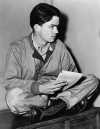Daily Content Archive
(as of Tuesday, October 29, 2019)| Word of the Day | |||
|---|---|---|---|
| |||
| Daily Grammar Lesson | |
|---|---|
Alternative QuestionsAlternative questions are questions that provide a choice among two or more answers. These choices might be explicitly stated in the question (identified by the coordinating conjunction "or"), or they might be implied by the context. What are alternative questions also known as? More... | |
| Article of the Day | |
|---|---|
 PostcardsPostcards are a way to send message-bearing cards through the mail without an envelope. The earliest known picture postcard was sent in London to the writer Theodore Hook in 1840. Hook most likely created the hand-painted card and sent it to himself as a practical joke on the postal service, since the image on the card is a caricature of post office workers. Today, stamp collectors and deltiologists—collectors of postcards—distinguish between postcards and postal cards. What is the difference? More... | |
| This Day in History | |
|---|---|
Delta and Northwest Merge to Form World's Largest Airline (2008)Founded as an aerial crop dusting operation in Georgia, Delta became the world's largest commercial air carrier more than 80 years after its inception when it merged with Northwest Airlines. The consolidation process was completed by January 31, 2010. Today, Delta has approximately 75,000 employees, and its headquarters in Atlanta includes the world's largest connecting hub. What employee relations issue caused problems during and after the merger with Northwest? More... | |
| Today's Birthday | |
|---|---|
 Bill Mauldin (1921)After joining the US Army as an infantryman in 1940, Mauldin began sketching cartoons about enlisted life. In 1944, he began producing his cartoons full time for the US military newspaper, Stars and Stripes. His portrayal of two cynical and unkempt American soldiers, Willie and Joe, made Mauldin a hero to American soldiers in World War II. Later, Mauldin became a political cartoonist for civilian papers. What fate had Mauldin intended for Willie and Joe at the end of the war? More... | |
| Quotation of the Day | |
|---|---|
 The desire of power in excess caused the angels to fall; the desire of knowledge in excess caused man to fall. The desire of power in excess caused the angels to fall; the desire of knowledge in excess caused man to fall.Francis Bacon (1561-1626) | |
| Idiom of the Day | |
|---|---|
take a bawling out— To receive a very severe rebuke, chastisement, or scolding (from someone). More... | |
| Today's Holiday | |
|---|---|
 Wexford Festival Opera (2025)The Wexford Festival Opera is best known for its staging of obscure or seldom-heard operas from the 17th to the 20th centuries. Held in a small seaport community in the southeastern corner of Ireland since 1951, the festival has based its success on its choice of rare operas and relatively unknown singers, many of whom have later become quite famous. Three operas are staged during the two-week festival in Wexford's Georgian-style Theatre Royal, built in 1832. The festival also features choral and symphonic concerts and a fireworks display. More... | |
| Word Trivia | |
|---|---|
Today's topic: noticeadvertisement - From advertir, Old French for "to notice," and ultimately from Latin advertere, "to turn toward." More... emit, emission, emissary - Emit, emission, and emissary come from Latin emittere, "send out," and emit once meant "publish a book or notice." More... notable, noticeable - Notable means "worthy of notice" and noticeable means "readily observed." More... remark - From an intensified French word marquer, "observe, notice," i.e. "making a verbal observation." More... | |